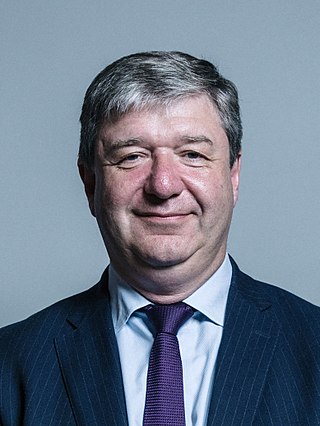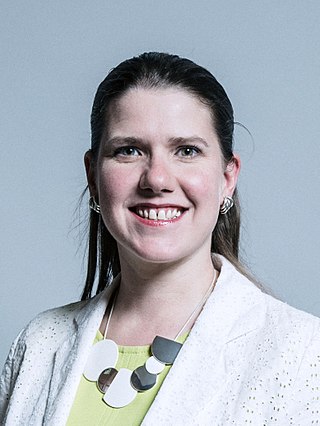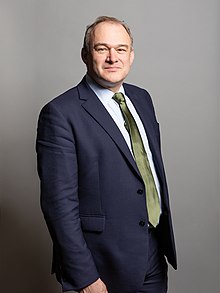
Walter Menzies Campbell, Baron Campbell of Pittenweem,, often known as Ming Campbell, is a Scottish Liberal Democrat politician, advocate and former athlete. He was the Member of Parliament (MP) for North East Fife from 1987 to 2015 and was the Leader of the Liberal Democrats from 2 March 2006 until 15 October 2007.

Sir Edward Jonathan Davey is a British politician who has served as Leader of the Liberal Democrats since 2019. He served in the Cameron–Clegg coalition as Secretary of State for Energy and Climate Change from 2012 to 2015 and as Deputy Leader to Jo Swinson in 2019. An "Orange Book" liberal, he has been the Member of Parliament (MP) for Kingston and Surbiton since 2017, and from 1997 to 2015.

Sir Norman Peter Lamb is a British politician and solicitor. He was the Liberal Democrat Member of Parliament (MP) for North Norfolk from 2001 to 2019, and was the chair of the Science and Technology Select Committee from 2017 to 2019.

Alexander Morrison "Alistair" Carmichael is a Scottish politician who has served as the Member of Parliament (MP) for Orkney and Shetland since 2001. A member of the Scottish Liberal Democrat, he currently serves as the Liberal Democrat Home Affairs, Northern Ireland and Justice spokesperson. He served as the Deputy Leader of the Scottish Liberal Democrats from 2012 to 2021.
In British politics, a Lib–Lab pact is a working arrangement between the Liberal Democrats and the Labour Party.

Sarah Virginia Brinton, Baroness Brinton, known as Sal Brinton, is a British politician who served as president of the Liberal Democrats from 2015 to 2020. In November 2010 she was nominated to the House of Lords, taking her place on 10 February 2011 having been created Baroness Brinton, of Kenardington in the County of Kent on 4 February. After Jo Swinson lost her seat at the 2019 United Kingdom general election, Brinton and Sir Ed Davey became acting co-leaders of the Liberal Democrats.

Joanne Kate Swinson is a British former politician who was Leader of the Liberal Democrats from July to December 2019. She was the first woman and the youngest person to hold the position, as well as the shortest-serving holder of the post. Swinson was Member of Parliament (MP) for East Dunbartonshire from 2005 to 2015 and 2017 to 2019. In September 2020 Swinson became Director of Partners for a New Economy (P4NE).
In the 2006 Liberal Democrats leadership election, Sir Menzies Campbell was elected to succeed Charles Kennedy as Leader of the Liberal Democrats, the third-largest political party in the United Kingdom.
This timeline of events in the Liberal Democrats leadership election, 2006 lists the events covering the period from Charles Kennedy's initial call for a leadership election with the Liberal Democrats to the conclusion of the 2006 Liberal Democrats leadership election.
The 2007 Liberal Democrats leadership election was held following the resignation of Sir Menzies Campbell as leader on 15 October 2007, after 19 months as leader of the Liberal Democrats, the third-largest political party in the United Kingdom. Vincent Cable, the deputy leader of the parliamentary party, was acting leader until the conclusion of the leadership election. The result was announced on 18 December 2007 with Nick Clegg winning by a narrow margin of 1.2%.

The Liberal Democrats are a liberal political party in the United Kingdom, founded in 1988. Since the 1992 general election, with the exception of the 2015 general election, they have been the third-largest UK political party by the number of votes cast. They have 15 members of Parliament in the House of Commons, 84 members of the House of Lords, four Members of the Scottish Parliament and one member in the Welsh Senedd. The party has nearly 3,000 local council seats. The party holds a twice-per-year Liberal Democrat Conference, at which party policy is formulated. In contrast to its main opponents' conference rules, the Lib Dems grant all members attending its Conference the right to speak in debates and vote on party policy, under a one member, one vote system. The party also allows its members to vote online for its policies and in the election of a new leader. The party served as the junior party in a coalition government with the Conservative Party between 2010 and 2015; with Scottish Labour in the Scottish Executive from 1999 to 2007, and with Welsh Labour in the Welsh Government from 2000 to 2003 and from 2016 to 2021.

The office of deputy leader of the Liberal Democrats is a position within the Liberal Democrats, a liberal political party in the United Kingdom. The position of Deputy Leader has never formally existed in the party constitution, however since the party's foundation, the Liberal Democrat parliamentary group in the House of Commons have usually elected a Deputy Leader. Although often referred to as the Deputy Leader of the Liberal Democrats, this post is actually only Deputy Leader of the Liberal Democrat parliamentary group in the House of Commons and not Deputy Leader of the Lib Dems as a whole.
The 2015 Liberal Democrats leadership election was held on 16 July 2015 following the resignation of Nick Clegg as leader on 8 May 2015, after almost eight years as leader of the Liberal Democrats, following the party's poor performance at the 2015 general election.
The 2017 Liberal Democrats deputy leadership election was announced on 14 June 2017, and Jo Swinson was elected unopposed on 20 June.
The 2017 Liberal Democrats leadership election was held following the resignation of Tim Farron as leader on 14 June 2017, after just under two years as leader of the Liberal Democrats. At the close of applications on 20 July 2017, Vince Cable was the only nominated candidate and was therefore declared the new leader of the party.
The 2019 Liberal Democrats leadership election was held following the announcement of the resignation of Vince Cable as leader on 24 May 2019, after just under two years as leader of the Liberal Democrats in the United Kingdom. The two candidates to succeed Cable were Ed Davey and Jo Swinson.

Jo Swinson was elected to lead the Liberal Democrats on 22 July 2019. However, she resigned the leadership following the loss of her seat in the 2019 General Election. Swinson was the first woman to lead the party, and also the youngest person to do so. The list that follows is the frontbench team led by Swinson in 2019.
The 2019 Liberal Democrats deputy leadership election was held in September 2019. It followed the election of the incumbent deputy leader Jo Swinson as party leader in July 2019.
This is a summary of the electoral history of Jo Swinson, the Leader of the Liberal Democrats from 22 July to 13 December 2019, and a Member of the United Kingdom Parliament from 2005 to 2019, when she lost her seat as MP for East Dunbartonshire in the 2019 General Election and, due to party rules, stepped down from her position as Leader of the Liberal Democrats.
The 2020 Liberal Democrats leadership election was held in August 2020, after Jo Swinson, the previous leader of the Liberal Democrats, lost her seat in the 2019 general election. It was initially set to be held in July 2020, but due to the COVID-19 pandemic it was delayed by six weeks, having been at first postponed until May 2021.

















